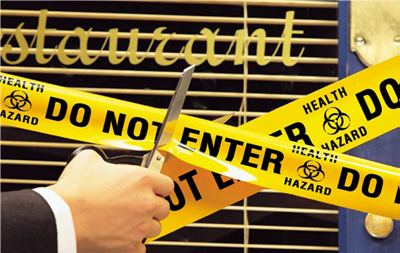Tuesday, 12 March 2024
The Food Safety Authority of Ireland (FSAI) today reported that ten Closure Orders were served on food businesses during the month of February for breaches of food safety legislation, pursuant to the FSAI Act, 1998 and the European Union (Official Controls in Relation to Food Legislation) Regulations, 2020. The Closure Orders were issued by Environmental Health Officers in the Health Service Executive (HSE).
Five Closure Orders were served under the FSAI Act, 1998 on:
- Lusk Chinese Take Away, Station Road, Lusk, Co. Dublin
- Offbeat Donuts (Closed area: Upstairs storage area only) (restaurant/café), 17 French Church Street, Cork
- Coriander Nepalese and Indian Restaurant, 1 Tramway Terrace, Douglas, Cork
- Strudel Artisan Bakery, 105 Patrick Street, Dun Laoghaire, Co. Dublin
- Amerta Chinese Restaurant, 1 Clifton Avenue, Monkstown, Co. Dublin
Five Closure Orders was served under the European Union (Official Controls in Relation to Food Legislation) Regulations, 2020 on:
- Hidden Dojo Asian Streetfood (take away) (Please note that both Hidden Dojo Asian Streetfood and Wakami Sushi & Asian are two food businesses under the one premises), 47A Phibsborough Road, Phibsborough, Dublin 7
- Wakami Sushi & Asian (take away) (Please note that both Hidden Dojo Asian Streetfood and Wakami Sushi & Asian are two food businesses under the one premises), 47A Phibsborough Road, Phibsborough, Dublin 7
- Shinu George (Closed area: Use of domestic premises to provide off-site catering) (take away), 8 Esker Avenue, Ardkeen Village, Waterford
- Hayashi (restaurant/café) 3 JKL Street, Edenderry, Offaly
- Pure Indulgence (Closed activities: the activities associated with the preparation, production and sale of food product with the claim 'Nut Free' in the above named food business premises) (Restaurant/ Café), Littlepace Shopping Centre, Littlepace, Clonee, Dublin 15
Some of the reasons for the Enforcement Orders in February include: evidence of a rodent infestation; significant amount of rodent droppings throughout the premises; the sale of food product with the claim 'nut free' in a premises that contains tree nuts and peanuts and has inadequate procedures in place to avoid cross-contamination; the preparation of raw chicken on the equipment sink, with blood present and without any evidence of cleaning; food not protected against contamination; uncovered cooked rice stored on a bin next to a container of raw chicken; storage of unlabelled food; the presence of personal items such as a mattress, blankets and duvet in the ambient food storage unit of the food business; the presence of cosmetics including face washes, oils and toothpaste at the kitchen food wash sink; failure to maintain temperature and monitoring records; evidence that articles, fittings and equipment coming into contact with food were not effectively cleaned and disinfected; use of a domestic premises to provide off-site catering.
Dr Pamela Byrne, Chief Executive, FSAI, said that food safety is a legal requirement and that all food businesses must comply with the law.
“Food safety is not a ‘nice to have’ in a food business. It’s a legal requirement and the law is there to protect consumer health. Consumers have a right to safe food and the food business owner is legally responsible for ensuring that the food they produce is safe to eat. Maintaining a clean premises that is fit for purpose, managing pest control, properly labelling produce and providing traceability information are mandatory legal requirements for all food businesses. By neglecting to uphold basic food safety and hygiene standards, a business not only jeopardises the health of its customers, but also risks damaging its own reputation as a trustworthy food business,” said Dr Byrne.
Details of the food businesses served with Enforcement Orders are published on the FSAI’s website. Closure Orders and Improvement Orders will remain listed in the enforcement reports on the website for a period of three months from the date of when a premises is adjudged to have corrected its food safety issue, with Prohibition Orders being listed for a period of one month from the date the Order was lifted.

